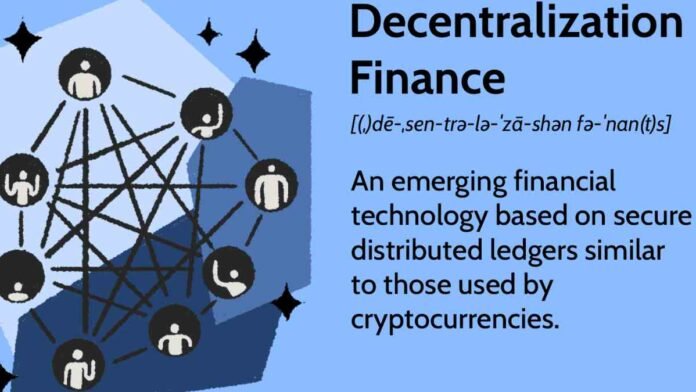Decentralized Finance (DeFi) is rapidly emerging as a transparent and permissionless means for users to engage with one another. For the first time this year, the value of assets used in DeFi surpassed $100 billion.
Decentralized Finance (DeFi) is a new style of finance in which there is no central authority and end users have complete control over their assets. It comprises of financial apps built on top of public and open source blockchain networks. As blockchains run on dispersed nodes and have no single point of failure, DeFi is a transparent and permissionless mechanism for users to engage directly with each other in peer-to-peer networks.
How does DeFi work?
DeFi is a Decentralized App (DApp) that runs on a blockchain network and does not need users to enter their government ID, email, address, or contact information. Instead, while setting up blockchain-enabled wallets, customers generate a password and obtain possession of a 12-word seed phrase in order to restore their account. Users may utilise DeFi to investigate opportunities for borrowing and lending, yield farming, trading on decentralised exchanges/marketplaces, crypto banking services, and much more once their wallets hold some coin.
The DeFi stack and smart contracts
Ethereum (ETH) is the blockchain network at the forefront of the DeFi field, and the majority of DeFi apps are based on Ethereum. Ethereum’s smart contracts, which function as financial contracts with stipulations expressed in computer code, have offered tremendous value to consumers. DeFi transactions are enabled through a four-layer stack that includes the settlement layer, protocol layer, application layer, and aggregate layer.
DeFi: The Financial Future?
DeFi is a new financial system that gives users complete ownership over their assets, eliminates single points of failure, resists censorship, and democratises access to financial services. The value of assets utilised in DeFi is expected to reach $100 billion by 2021, with prominent DeFi applications including UniSwap, SushiSwap, Curve, Compound, dYdX, Aave, and others. Unfortunately, the DeFi sector is still in its infancy and faces several obstacles, including poor performance, a bad user experience, a high risk of user mistake, and the rare fraud. DeFi’s worldwide, transparent, and open-source character also calls into question existing banking legislation throughout the world. Billionaire investor Mark Cuban believes DeFi will offer a significant challenge to established banks.
Sumit Gupta, Co-Founder and CEO of CoinDCX, also believes that DeFi will not completely replace banks, but that banks will find a way to integrate DeFi into their systems and achieve coexistence. It remains to be seen how the future of finance will play out as huge banks around the world take note of DeFi and its potential to disrupt traditional financing.



